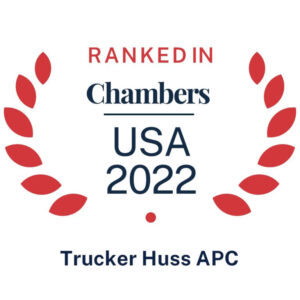RYAN KADEVARI and JENNIFER TRUONG, February 22, 2022
On February 4, 2022, the Departments of Labor, Health and Human Services (HHS), and the Treasury (collectively, the Departments) released additional guidance concerning group health plan and health insurance coverage of over-the-counter COVID-19 diagnostic tests (“OTC Tests”). The guidance complements an initial set of FAQs previously issued on January 10, 2022, which required group health plans and health insurance issuers to cover OTC Tests purchased on or after January 15, 2022. (The first round of guidance was addressed in a Trucker Huss Special Alert issued last month, “Health Plans and Insurers Required to Cover At-Home COVID Tests.”)
In this new round of guidance, the Departments clarify (and even modify) certain provisions of the safe harbors that allow qualifying health plans and issuers to limit certain OTC Test reimbursement amounts and quantities. The February 4, 2022 guidance also addresses limitations which are permitted to prevent fraud, as well as OTC Test reimbursements under health flexible spending accounts (FSAs), health reimbursement arrangements (HRAs), and health savings accounts (HSAs).
Background
Under Section 6001 of the Families First Coronavirus Response Act (FFCRA), group health plans and issuers must provide COVID-19 diagnostic testing without any cost-sharing, prior authorization, or other medical management requirements.
On January 10, 2022, the Departments issued FAQs confirming that the FFCRA requirement to cover diagnostic COVID tests also applies to OTC Tests that are available without a prescription or individualized clinical assessment from a health care provider. Although the first set of FAQs provided two safe harbors to incentivize plans and issuers to facilitate access to free OTC Tests, many employers and claims administrators had questions about application of the safe harbor requirements.
First, the January 10, 2022 guidance introduced a safe harbor (referred to in this article as the direct coverage safe harbor) which permits plans to cap reimbursement amounts at $12 per test or the actual cost of the test, whichever is lower. To qualify for the safe harbor, a plan must arrange for direct coverage of OTC Tests (i.e., participants are not required to seek reimbursement after purchasing OTC Tests) through both its pharmacy network and a direct-to-consumer shipping program. Although the safe harbor does not allow plans to restrict reimbursements to only OTC Tests provided through its preferred pharmacies or retailers, qualifying plans can limit reimbursement amounts for OTC Tests obtained outside the direct coverage program to no more than $12 per test. Under the safe harbor, a participant cannot be subject to any upfront out-of-pocket expenditures, prior authorization, or medical management requirements. In addition, plans must ensure participants have “adequate access” to OTC Tests. The guidance stated that adequate access is to be determined based on all relevant facts and circumstances.
Second, the guidance introduced another safe harbor (referred to in this article as the quantity limit safe harbor), which allows plans to limit the number of OTC Tests reimbursed without an order by a health care provider to 8 tests per 30-day period or calendar month. A plan or issuer satisfies the safe harbor rule if it provides coverage without cost-sharing for OTC Tests purchased without the involvement of a health care provider or a prescription. Like the direct coverage safe harbor, plans cannot impose upfront out-of-pocket expenditures, prior authorization, or medical management requirements on participants.
Subsequently, on February 4, 2022, the Departments issued another set of FAQs to clarify many of the requirements laid out in the January 10, 2022 guidance. Taken together, the two sets of FAQs provide plans with information to facilitate and promote access to testing, as discussed below.
Direct Coverage Safe Harbor Requirements Modified to Provide Plans and Issuers with Flexibility
As described above, the Departments’ January 10, 2022 guidance introduced the direct coverage safe harbor for plans and issuers. The guidance specified that in order to ensure participants have adequate access to OTC Tests, plans and issuers were required to make OTC Tests available through a pharmacy network and a direct-to-consumer shipping mechanism to qualify for the direct coverage safe harbor. However, on February 4, 2022, the Departments modified the safe harbor requirement to provide plans and issuers with greater flexibility to determine how they will provide access to OTC Tests. Specifically, the Departments have walked back from the requirement that plans and issuers must provide access to OTC Tests through both a pharmacy network and a direct-to-consumer shipping mechanism. Instead, the Departments now state that adequate access will “generally” require that OTC Tests are available through at least one direct-to-consumer shipping mechanism and at least one in-person mechanism — although the determination will remain a facts-and-circumstances test. The February 4, 2022 FAQs also provide additional examples of “direct coverage” mechanisms, including direct-to-consumer shipping programs that allow online or telephone ordering; and the ability to obtain OTC Tests through a plan’s pharmacy network and through non-pharmacy retailers (e.g., the plan provides coupons for participants to redeem for OTC Tests without cost-sharing at specified retailers).
Trucker Huss Insight: In a footnote, the Departments confirmed that there may be circumstances in which a plan’s direct coverage program could provide adequate access to OTC Tests without establishing both a direct-to-consumer shipping mechanism and an in-person mechanism. The Departments provide the example of a small employer plan covering employees that live and work in a “localized area” and obtain OTC Tests from a nearby location. However, this example also underscores that many employers, especially those with large workforces located across different counties and states, will likely still need to offer both direct-to-consumer shipping and in-person mechanisms for obtaining OTC Tests to qualify for the safe harbor. This guidance applies prospectively, beginning February 4, 2022.
Departments Clarify Direct-to-Consumer Shipping and In-Person Mechanisms
The February 4, 2022 guidance clarifies that a direct-to-consumer shipping mechanism refers to any program that provides access to OTC Tests without requiring participants to obtain the tests at an in-person location. A plan’s direct-to-consumer shipping scheme can include online or telephone ordering, and it does not need to be exclusively provided through a single entity. For example, a plan that opts to provide in-person OTC Tests through specified retailers is considered to provide a direct-to-consumer shipping mechanism if those retailers also have online platforms where individuals can order tests for direct delivery. In addition, the guidance states that when providing OTC Tests through a direct-to-consumer shipping mechanism, plans must cover reasonable shipping costs in a manner that is consistent with other items or products that are provided by the plan via mail order.
The Departments also clarify that the direct coverage safe harbor does not require plans and issuers to make all OTC Tests available through its direct coverage programs. Accordingly, a plan can be considered to provide adequate access to OTC Tests even if only certain OTC Tests are available through the direct coverage program (e.g., if direct coverage of OTC Tests is limited to certain manufacturers, including those with whom the plan has a contractual relationship).
Trucker Huss Insight: The guidance clarifies that if OTC Tests are provided via a direct-to-consumer shipping program, the plan must cover reasonable shipping costs related to the tests. Even if a participant obtains an OTC Test outside the plan’s direct coverage program (e.g., the participant goes to a non-preferred pharmacy or retailer and pays upfront for the OTC Test), the cost of the test includes the shipping and sales tax related to the purchase of the test. Accordingly, a plan must cover the cost of the OTC Test (including shipping costs and sales tax) up to the $12 per test limit. Notably, the Departments did not expressly address whether shipping and sales tax are included in the cost of OTC Tests if a plan or issuer has not established a direct coverage program.
Further, the Departments have consistently stated that whether there is adequate access under a plan’s direct coverage program depends on all relevant facts and circumstances, including the location of participants, utilization rates of pharmacy networks, and whether participants are notified of and made aware of these locations. In the February 4, 2022 FAQs, the Departments indicate that they may request plansand issuers to provide information (e.g., the number and location of in-person options) to ensure that participants have adequate access. Accordingly, plans and issuers should be prepared to demonstrate that their direct coverage programs provide participants with adequate access based on the factors outlined in the Departments’ guidance.
Note: The clarifying guidance discussed in this section also applies prospectively, beginning February 4, 2022.
Departments Clarify Impact of Temporary Supply Shortages on Safe Harbors
In the January 10, 2022 guidance, the Departments had stated that if a plan or issuer which is relying on the direct coverage safe harbor is at any time unable to meet the requirements of the safe harbor (e.g., due to delays in direct-to-consumer shipping), then the plan or issuer could not deny coverage or impose cost-sharing (e.g., limiting reimbursement amounts) for OTC Tests, including tests purchased from non-preferred sellers. Considering the high demand for and limited supply of OTC Tests, ensuring the consistent availability of OTC Tests appeared to be a substantial hurdle for many plans and issuers hoping to satisfy the safe harbor.
Fortunately, the February 4, 2022 guidance provides welcome clarification regarding plans’ obligations to obtain OTC Tests. Now the Departments state that a plan or issuer is not considered out of compliance with the direct coverage safe harbor if it is temporarily unable to provide adequate access due to a supply shortage. Accordingly, plans and issuers may continue to cap reimbursements of tests purchased outside of the direct coverage program at $12 (or the actual cost of the test) while OTC Tests are temporarily unavailable. Furthermore, the Departments note that a plan is not out of compliance with Section 6001 of the FFCRA (requiring plans to cover OTC Tests) if a participant is unable to obtain at least 8 OTC Tests per 30-day or monthly period.
Trucker Huss Insight: Although the Departments will not take enforcement action against a plan or issuer due to supply shortages, the relief only applies when a plan or issuer is temporarily unable to provide adequate access to OTC Tests. Unfortunately, the February 4, 2022 guidance does not define “temporarily” or provide any examples illustrating the scope of this relief.
Departments Permit Plans to Limit Reimbursements to OTC Tests Purchased from Established Retailers
In the January 10, 2022 guidance, the Departments acknowledged the possibility of fraud and abuse for OTC Test coverage. The guidance suggested that plans could require attestation that an OTC Test was purchased for personal use or require documentation verifying reimbursement as reasonable steps to address fraud and abuse. However, the guidance cautioned that overly burdensome attestation or documentation requirements would not be considered reasonable.
The February 4, 2022 guidance expands on additional tools and steps that plans and issuers can implement to discourage problematic behavior which could ultimately limit consumer access to OTC tests. The Departments expressly allow plans and issuers to implement policies that deny reimbursements for OTC Tests which are purchased from private individuals through person-to-person sales, online auctions, and resale marketplaces. Among other methods for stopping abuse, the Departments permit plans to require reasonable documentation of proof of purchase clearly identifying the seller (e.g., a receipt or UPC code).
Trucker Huss Insight: In designing and implementing OTC Test reimbursement procedures, plans should carefully weigh the benefits of discouraging and preventing fraud against the burden imposed on participants. Further, any limitations or requirements for reimbursements must be clearly communicated to participants. In the February 4, 2022 guidance, the Departments made it clear that undue burdens or delays to reimbursement remain prohibited, and the ultimate goal continues to be facilitating participant access to OTC Tests.
OTC Tests Must Be Self-Administered and Self-Read
In their January 10, 2022 guidance, the Departments stated that OTC Tests are tests approved, cleared or authorized by the Food and Drug Administration (FDA) which can
be obtained without a prescription and used without a health care provider. The February 4, 2022 guidance clarifies that the coverage requirements set forth in the January 10, 2022 and February 4, 2022 FAQs only apply to COVID-19 tests that are approved or authorized to be self-administered and self-read without the involvement of a health care provider. Accordingly, diagnostic COVID-19 tests, like PCR tests, that rely on at-home collection but require samples to be mailed to a facility for analysis are not covered under the Departments’ OTC Test guidance.
Trucker Huss Insight: The Departments continue to remind plans that although OTC Tests are only eligible for coverage if both the test administration and reading can be performed at-home, a plan may still be required to cover diagnostic COVID-19 tests that require laboratory analysis of samples if the tests are ordered by an attending health care provider who has determined that the tests are medically appropriate. Accordingly, plans should keep in mind the existing rules regarding coverage of COVID-19 diagnostic testing under FFRCA and CARES — in addition to the OTC Test coverage rules.
Departments Address Interaction Between OTC Test Coverage Requirements and Reimbursements under Health FSAs, HRAs, and HSAs
While it’s not discussed in the January 10, 2022 guidance, the February 4, 2022 guidance confirms that OTC Tests are medical expenses that are generally reimbursable from Health FSAs, HRAs, and HSAs. Although plans and issuers are required to cover OTC Tests, the guidance clarifies that the cost (or the portion of the cost) of OTC Tests which were already paid or reimbursed by a plan or issuer cannot be reimbursed [again] through a Health FSA, HRA or HSA (i.e., participants cannot “double dip”). Accordingly, plans should proactively notify participants, beneficiaries, and enrollees not to seek reimbursement for OTC Tests via a Health FSA, HRA or HSA where the cost of an OTC Test has been (or will be) paid or reimbursed by a plan or issuer.
Trucker Huss Insight: The February 4, 2022 guidance states that the cost “or the portion of the cost” of OTC Tests paid or reimbursed by a plan or issuer cannot be reimbursed as a qualifying medical expense under a Health FSA, HRA or HSA. This language indicates that the portion of costs that are not paid or reimbursed by a plan or issuer could still be reimbursed by a Health FSA, HRA or HSA. For example, if a participant obtains an OTC Test from outside the plan’s direct coverage program, and the medical plan limited the reimbursement amount to $12, the portion of the OTC Test that was not covered by the plan may still be reimbursed by the participant’s Health FSA.
Please contact us with any questions.




